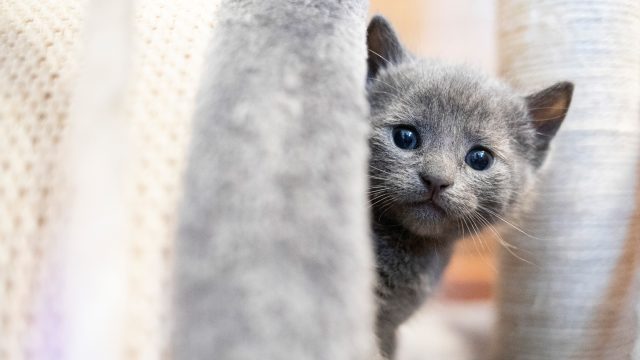
Courtroom Animal Advocate Programs (CAAP)
What are CAAP laws?
Courtroom Animal Advocate Program (CAAP) laws allow legal practitioners — supervised law students or volunteer lawyers — to advocate for animal victims in criminal cruelty cases. Volunteers appear in court and assist the judge by drafting briefs, conducting research, gathering information from veterinarians, animal control officers, and law enforcement officials, and making recommendations on behalf of the animal victim’s interests.
Why Do States Need CAAP Laws?
These trained advocates help the legal system reach fair outcomes. Everyone involved in the criminal justice system — from defense attorneys, to prosecutors, to judges — faces crowded dockets and scarce resources. Considering the relative complexity of animal crime cases — involving victims who are unable to speak for themselves, forensic challenges usually associated with homicides or sexual assault cases, and living “evidence” who need food, water, socialization, and veterinary care — the needs of the animal victim may not be considered.
Defense attorneys have a duty to their client, prosecutors have a duty to the state, but no one is tasked with directing the court’s attention to the animal’s needs. Animals involved in cruelty cases require special considerations. For example, a dog may languish in a shelter while her abuser awaits trial, kittens born to a cat held as evidence will need to be placed in loving homes, and dogs used in fighting will almost certainly require rehabilitation.
CAAP laws provide animal crime victims with an advocate whose duty is to represent the animal’s interests — properly contextualized within criminal law. CAAP laws do not create any new criminal violations or penalties. Nor do they change which animals are eligible for criminal protection. CAAP laws work within the state’s existing animal cruelty statutes. Additionally, states that have CAAP laws may expand their animal protection laws without amending the CAAP statute.
Dozens of studies document the strong link between animal cruelty and violence against humans, particularly the link between animal abuse and other forms of abuse such as elder abuse, child abuse, and domestic violence. Recognizing this link, the FBI now collects data on animal cruelty crimes alongside other felonies like homicide and arson. The FBI also includes animal cruelty as a category in its National Incident-Based Reporting System. CAAP laws protect both animals and humans by making it more likely that animal abusers will receive effective sentences.
The History of CAAP Laws
The first CAAP law was enacted in 2016 in Connecticut. Also known as “Desmond’s Law,” Connecticut’s law gives animals a voice in the courtroom. The law is named in honor of a dog, Desmond, who was starved and severely abused before being strangled to death. Desmond’s Law is already making a positive impact. In the years since the law’s enactment, animal cruelty investigations and prosecutions have increased in Connecticut.
Both Professor Jessica Rubin, director of the legal practice program at University of Connecticut Law School and instrumental in creating Desmond’s Law, and the bill sponsor, Representative Diana Urban were named Top Animal Defenders of 2018 by the Animal Legal Defense Fund.
By providing animal victims with their own in-court advocate, CAAP laws trace their legal DNA back even further to the 2007 Michael Vick dog fighting case. In the Vick case, a federal judge appointed Professor Rebecca Huss of Valparaiso University School of Law as a guardian/special master. Professor Huss was tasked with making independent recommendations to the court for the disposition of each seized dog after considering their well-being.
While many dog fighting rings had been prosecuted prior to 2007, this was the first prosecution where an attorney was appointed by the court to advocate for the animal victims. Her appointment made a critical difference — not only were the lives of individual dogs saved, it fundamentally shifted the default for victims of dog fighting from euthanasia to rehabilitation.
Model CAAP Law Language
Read the Animal Legal Defense Fund’s model CAAP bill language. This language can be adapted to fit the needs of individual states. The Animal Legal Defense Fund provides free legal assistance to advocates operating under a CAAP law, just as we do for prosecutors, law enforcement, judges, and veterinarians handling animal cruelty cases.
Become a Partner in Protection
Partners in Protection program makes it easier than ever for members to help animals throughout the year. It simplifies the donation process for you by automatically charging the amount you specify to your credit card every month.
Focus Area
How We Work
Related
-
Resolution Opposing Elective Cat Declaw Surgeries Introduced in the U.S. House of Representatives
Declawing is a cruel surgical procedure to remove the last bone in a cat's toesDecember 16, 2025 Press Release -
City of Sturgeon Agrees to Pay $500,000 in Settlement Over Police Shooting of Blind, Deaf Dog
The lawsuit argued the lethal force used violated the 4th amendmentNovember 14, 2025 Press Release -
California Governor Signs Animal Protection Bills into Law
The Animal Legal Defense Fund sponsored two bills protecting cats and wild animalsOctober 21, 2025 News




